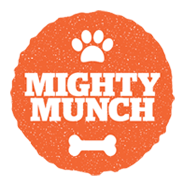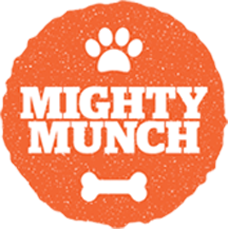We always know our dogs are going to eventually start to age, but it’s so sad when we start to see the signs of it, especially if our older dogs are dealing with pain. Dog degenerative joint disease (DJD), also known as osteoarthritis, is one of the most common conditions affecting ageing dogs.
Degenerative joint disease in dogs causes the breakdown of cartilage in the joints, leading to pain, stiffness, and a reduced quality of life for our canine companions. They struggle to walk without pain, they can’t play like they used to, and it’s devastating to see.
So, what are the options for dog degenerative joint disease treatment? Is there anything you can do to help your pup live a pain-free, mobile life as they age? We’ll give you more details in the article, but one of the most effective, natural, non-invasive treatments is dog joint supplements.
At Mighty Munch, we have an amazing selection of supplements designed to support your dog’s joint health. Formulated by vets, our supplements contain natural, key ingredients, and no fillers or additives. With the right supplements, you can give your dog the support they need for a happy, pain-free, longer life!
What is Degenerative Joint Disease in Dogs?
Dog degenerative joint disease is a chronic condition in which the cartilage cushioning a dog’s joints gradually breaks down. This cartilage acts as a shock absorber, allowing for smooth, pain-free movement of the joints. As it deteriorates, the bones within the joint begin to rub together, causing inflammation, pain, and decreased mobility.
DJD in dogs mostly affects older dogs but can also occur in younger dogs due to injury, genetic predisposition, or developmental issues like hip or elbow dysplasia. The condition worsens with time, and while there is no cure, early detection and treatment can help slow its progression and keep your dog more comfortable.
Degenerative Joint Disease in Dogs Symptoms
It’s important to understand the degenerative joint disease in dogs symptoms, so that you can identify DJD in dogs early and start treating your dog before their pain becomes unmanageable. Here’s an idea of the degenerative joint disease in dogs symptoms to look out for.
Stiffness and Limping
One of the earliest and most noticeable signs of DJD in dogs is stiffness, especially after resting or in the morning. Dogs with DJD may also begin to limp, favouring one leg over the other as the disease affects specific joints. This stiffness may improve slightly with movement but can worsen after too much activity.
Difficulty Moving or Rising
As dog degenerative joint disease progresses, dogs may struggle to stand up, jump onto furniture, climb stairs, or get in and out of the car. The pain and discomfort caused by DJD make it harder for them to use their joints, and you may notice them hesitating before moving or taking longer to rise from a resting position.
Reduced Activity and Energy Levels
Dogs with DJD often exhibit a noticeable reduction in their overall activity and energy levels. Once-active dogs may become more lethargic, preferring to rest rather than play or go on walks. This behaviour can sometimes be mistaken for normal ageing, but it may be directly related to the discomfort caused by the disease.
Swelling or Sensitivity Around Joints
You might notice swelling or tenderness around your dog’s joints as the inflammation worsens. In some cases, the affected joints (like the dog hock joint) may feel warm to the touch.
Dogs may also react negatively if you try to touch or massage the areas surrounding their inflamed joints, pulling away or showing signs of discomfort. You might also notice dogs joints clicking as your dog walks.
Behavioural Changes Due to Pain
Chronic pain can lead to noticeable behavioural changes in dogs. They may become irritable, anxious, or less tolerant of touch. Dogs suffering from DJD might avoid being handled or groomed, growl or snap when someone touches their sore joints, or seem less social than they once were.
Getting a Professional Diagnosis
If your dog is showing any of these symptoms of dog degenerative joint disease, it’s important to consult your vet for a professional diagnosis. A thorough physical exam, along with X-rays or other imaging tests, can confirm a DJD diagnosis, allowing you to move on to dog degenerative joint disease treatment options.
What Causes Degenerative Joint Disease in Dogs?
So, what causes degenerative joint disease in dogs? Here are some of the reasons why you might be seeing the dog joint pain symptoms we mentioned earlier.
Age-Related Degeneration
Just like in humans, our dog’s joints break down over time, making senior dog arthritis and other joint conditions, like DJD, very common. Over time, the cartilage that cushions the joints deteriorates, leading to inflammation, pain, and decreased mobility.
This age-related degeneration is the most common cause of DJD in dogs, particularly in larger breeds that place more stress on their joints. It’s one of the reasons why finding the right joint supplements for older dogs is so important.
Is Degenerative Joint Disease in Dogs Hereditary?
Yes - certain breeds are more predisposed to joint issues due to their genetics. Breeds like German Shepherds, Labradors, and Golden Retrievers are at a higher risk of developing DJD due to conditions such as hip and elbow dysplasia, which are genetically linked.
If a dog has parents or grandparents with joint problems, they may be more likely to develop DJD at some point in their life. If you want to learn more about hip dysplasia, check out our guides on dog hip dysplasia home treatment and how to tell if your dog has hip dysplasia.
Joint Injuries and Trauma
What causes degenerative joint disease in dogs besides age and genetics? Joint injuries, including fractures, ligament tears, or dislocations, can significantly increase the risk of developing DJD later in life. Even when these injuries heal, they can leave the joint weakened and more susceptible to degeneration.
Obesity and Poor Joint Health
Obesity is another major risk factor for degenerative joint disease in dogs. Excess body weight puts additional stress on a dog’s joints, particularly in the hips and knees. Over time, this added pressure accelerates the breakdown of cartilage, leading to early-onset arthritis.
Keeping your dog at a healthy weight is essential for dog joint care and preventing the development of DJD. Also, poor diet or lack of exercise can weaken joint health, further contributing to the condition.
Dog Degenerative Joint Disease Treatment Regimen
If your dog is diagnosed with DJD, what can you do? What's good for dogs joints? As we mentioned, there’s no cure for DJD, but there are steps you can take for dog joint pain relief, letting your dog live a healthier, more comfortable life and extending their degenerative joint disease in dogs life expectancy.
Joint Supplements
Finding the best joint supplement for dogs is a great place to start when it comes to managing DJD. At Mighty Munch, we have premium hip and joint meal toppers for dogs, made from key active ingredients like glucosamine, chondroitin, and MSM for dogs.
Our hip and joint meal topper is much more effective than homemade toppers for dog food, because it’s formulated by vets who understand exactly what your dog needs for healthier joints. Our joint supplements provide pain relief, reduce joint inflammation, and improve mobility.
As well as our joint supplement, we have other top-rated dog supplements in Australia, including our collagen for dogs, dog fish oil, and dog probiotic. All our supplements are manufactured in Australia in a facility that exceeds the country’s pet safety standards, so you know your pup is in good hands with Mighty Munch!
Pain Management Medications
As well as switching to the best dog food for arthritis Australia, medication can also help manage your dog’s joint pain. Be warned, though - long-term use of some medications can have side effects, so it’s essential to work closely with your vet to monitor your dog’s response and adjust the treatment as needed.
What can I give my dog for joint pain at home, in terms of medication? Nonsteroidal anti-inflammatory drugs (NSAIDs) are commonly prescribed to reduce inflammation and alleviate pain. Other medications, such as gabapentin or tramadol, may also be used to manage chronic pain.
Physical Therapy and Rehabilitation
If you’re wondering how to help a dog with arthritis at home but don’t to rely too heavily on pain medications, physical therapy can play a significant role in maintaining and improving your dog’s mobility.
Rehab exercises, underwater treadmills, and laser therapy are common methods used to strengthen muscles around the joints, increase range of motion, and reduce stiffness. These therapies help dogs retain mobility and keep the joints as functional as possible.
Weight Management Protocol
Maintaining a healthy weight is one of the most important factors in managing DJD. Extra weight puts added stress on already-damaged joints, worsening symptoms and speeding up cartilage breakdown.
A weight management protocol that includes a balanced diet and regular, low-impact exercise can significantly improve your dog’s quality of life. Even a modest weight loss can reduce joint pain and improve mobility for dogs suffering from DJD.
Acupuncture, Massage Therapy, Stem Cell Therapy, and Other Less Traditional Treatments
As well as conventional treatments, you can learn how to help dogs joints with alternative therapies. Acupuncture, which involves the insertion of thin needles into specific points on the body, may help reduce pain and inflammation.
Massage therapy can improve circulation and relieve muscle tension around the joints. Stem cell therapy is a newer treatment that uses a dog’s own stem cells to regenerate damaged tissue. And top rated orthopedic dog beds Australia can provide joint support while your dog rests.
Does Surgery Make Sense?
In severe cases of DJD, and if other treatments aren’t working, surgery may be considered. Surgical options vary depending on the affected joint and the dog’s overall health. Procedures like joint replacement (common for hips) or joint fusion may be recommended to alleviate pain and restore mobility.
Degenerative Joint Disease in Dogs Life Expectancy
With proper care and management, many dogs with DJD can live long, fulfilling lives. However, it’s important to understand how the condition can indirectly affect their overall health and how focusing on quality of life is crucial in managing DJD. Here’s what you need to know.
Impact of DJD on Life Expectancy
In terms of degenerative joint disease in dogs life expectancy, your dog’s reduced mobility may lead to weight gain, decreased physical activity, and a lower overall energy level, which can put strain on other parts of the body, including the heart and lungs.
In severe cases, DJD may also result in secondary issues like muscle atrophy or joint infections, which can be quite serious and may affect their life expectancy. The best way to ensure your dog’s life isn’t devastatingly cut short is to detect and treat DJD as early as possible.
Focus on Quality of Life and Enjoy the Time You Have Left
There’s no cure for DJD, so your whole focus should be on pain relief and comfort, giving your dog the highest quality of life possible. This means not only managing pain but also ensuring they stay active, happy, and engaged in their daily activities.
It’s such a sad truth that our pets can’t live forever, but one we have to come to terms with eventually. Keep your dog as comfortable as possible and try to take the time to enjoy every second with them - our dogs’ lives can be heart-breakingly short.
Final Thoughts on Treatment for Degenerative Joint Disease in Dogs
DJD can be a devastating condition that leaves our beloved furry friends in constant pain, to the point where they can’t even enjoy a morning walk or jump up onto the couch for snuggles. There’s no cure, but there are steps you can take to reduce their pain and keep your dog as mobile as possible.
One of the most effective, natural treatments for DJD is joint supplements. Adding a daily joint supplement to your dog’s diet can significantly improve their quality of life and reduce their pain, giving you more precious years with a healthy, happy pup.
At Mighty Munch, we have the best dog supplements Australia for DJD, designed to provide natural, lasting pain relief. Help your dog enjoy pain-free golden years - keep them by your side for longer with Mighty Munch dog joint supplements.


